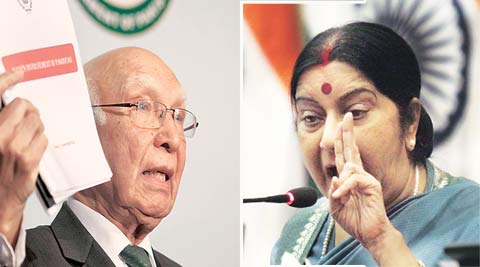Opinion Tough road ahead
Delhi needs to ask itself if it has handled the latest face-off with Pakistan in a way that most serves India's best interests.

 India and Pakistan both have excellent reasons to avoid conflict: the former because it will imperil its economic revival; the latter because it will to a near-certainty suffer far greater losses. (Source: AP photo/Prem Nath Pandey)
India and Pakistan both have excellent reasons to avoid conflict: the former because it will imperil its economic revival; the latter because it will to a near-certainty suffer far greater losses. (Source: AP photo/Prem Nath Pandey)
Once again, India and Pakistan have succeeded in making the worst of all possible choices. It may be possible to understand the frustrations that led New Delhi to call off the national security advisor-level dialogue. Prime Ministers Narendra Modi and Nawaz Sharif agreed, at Ufa, on meetings between the NSAs on terrorism, followed by meetings between military commanders and border guard chiefs. The idea, as clearly stated, was to address security issues, leaving the two prime ministers free to widen the dialogue at a later stage. Pushed by domestic pressures, however, Pakistan sought to interject Kashmir into the conversation. Irritation, though, is a bad reason for action between two nuclear powers. India’s sovereignty in Jammu and Kashmir is not so fragile as to be compromised by Sartaj Aziz meeting the Hurriyat. Past meetings, after all, have done nothing to improve Pakistan’s hand. There is wisdom in leaving room between impulse and action — and it’s hard to escape the conclusion that Delhi’s strategic planners failed on this count.
Delhi needs to ask if it has handled the confrontation in a manner that most serves India’s best interests. Modi’s decision, at Ufa, to agree to narrow, security-focused talks held out real possibilities. Delhi had to use diplomatic engagement to draw global attention to Pakistan’s continued support for terrorism. It also had a platform to make clear that its patience was not endless. Had Pakistan been recalcitrant, Delhi could have refused to widen the dialogue, or called off talks pending action. Few in the international community would have taken exception to such a course of action. Instead, Delhi is being accused now of petulance in world capitals — this impression does not sit well with claims to be a major global actor.
The most important question, of course, is where India and Pakistan go from here. There’s a more than even chance Pakistan will seek to escalate tensions on the so-far quiet northern stretches of the Line of Control, to obstruct India’s annual reconstruction work on the counter-infiltration fence. There could be crossborder terrorist attacks and one or more of them may claim more lives than the government can countenance. Modi must be prepared with workable responses. India and Pakistan both have excellent reasons to avoid conflict: the former because it will imperil its economic revival; the latter because it will to a near-certainty suffer far greater losses. To avoid this worst case outcome, though, will require levels of maturity and self-reflection little in evidence this past week.


